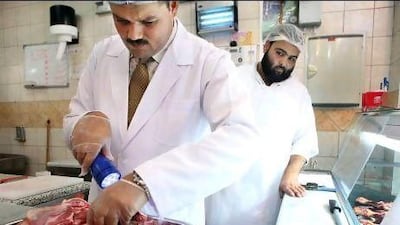The inspector prods the slab of raw meat with a gloved finger before leaning in for a closer look.
His nostrils flare as his suspicions are confirmed - it is bad.
He immediately orders the 40-kilogram lump to be thrown out and the shop, Luqman Butchery in Abu Dhabi's Mina Zayed Meat Souq, is issued with a final warning.
The inspection yesterday morning was part of an unannounced visit to butcher shops in the capital by the Abu Dhabi Food Control Authority, which is increasing its efforts to improve hygiene in stores and slaughterhouses.
The campaign takes on extra importance in summer and with Ramadan just around the corner.
Ali Al Saad, the spokesman for the authority, said it usually put more focus on inspections in this period.
The eight inspectors visited 23 shops in the Madinat Zayed Vegetable and Meat Market and the Mina Zayed Meat Souq, of which almost half failed to meet regulations.
Ten warnings were issued for various offences, which included unhygienic cutting boards, not disposing of unusable meat, overpacking meat freezers, not switching on insect traps and staff not wearing head covers.
Warnings were also issued to butchers who had not separated their meat for sale from discards, such as livers, kidneys and hearts.
None were charged with serious breaches, which can lead to a shop being closed down if it receives three in a year.
The senior inspector Mansour Abdellatif said it had been three years since the last shop was closed.
"Previously we had a lot of violations, but they keep improving their practices and now we don't experience it any more," Mr Abdellatif said.
The inspectors' visits are thorough. They spend about 10 minutes in each establishment conducting checks that include using torches to inspect the cleanliness of the fridge door frames.
They use two types of thermometers, laser and needle, to check the exact temperature of the meat.
If the temperature of the fridges is found to be more than 10°C, the meat is thrown out immediately and the store given a warning.
Mr Abdellatif said the food authority's regulations stated fresh meat was allowed a shelf life of up to 20 days, but inspectors did not count on that as temperatures might have varied.
"We rely on our senses and look at the characteristics of the meat, such as the colour, smell and texture," he said.
Rashed Al Shamsi, the head of the meat-inspection unit, said the food authority conducted routine checks at all times of the day, even as early as 4am.
Butchers who have not received a warning for a year are given a certificate with a grade "A" or "B", showing that they have been sticking to regulations.
Mr Al Saad said the hygiene in Abu Dhabi's 490 butcher shops had increased greatly.
"The awareness is much better now than it used to be," he said. "We can definitely see the difference."

